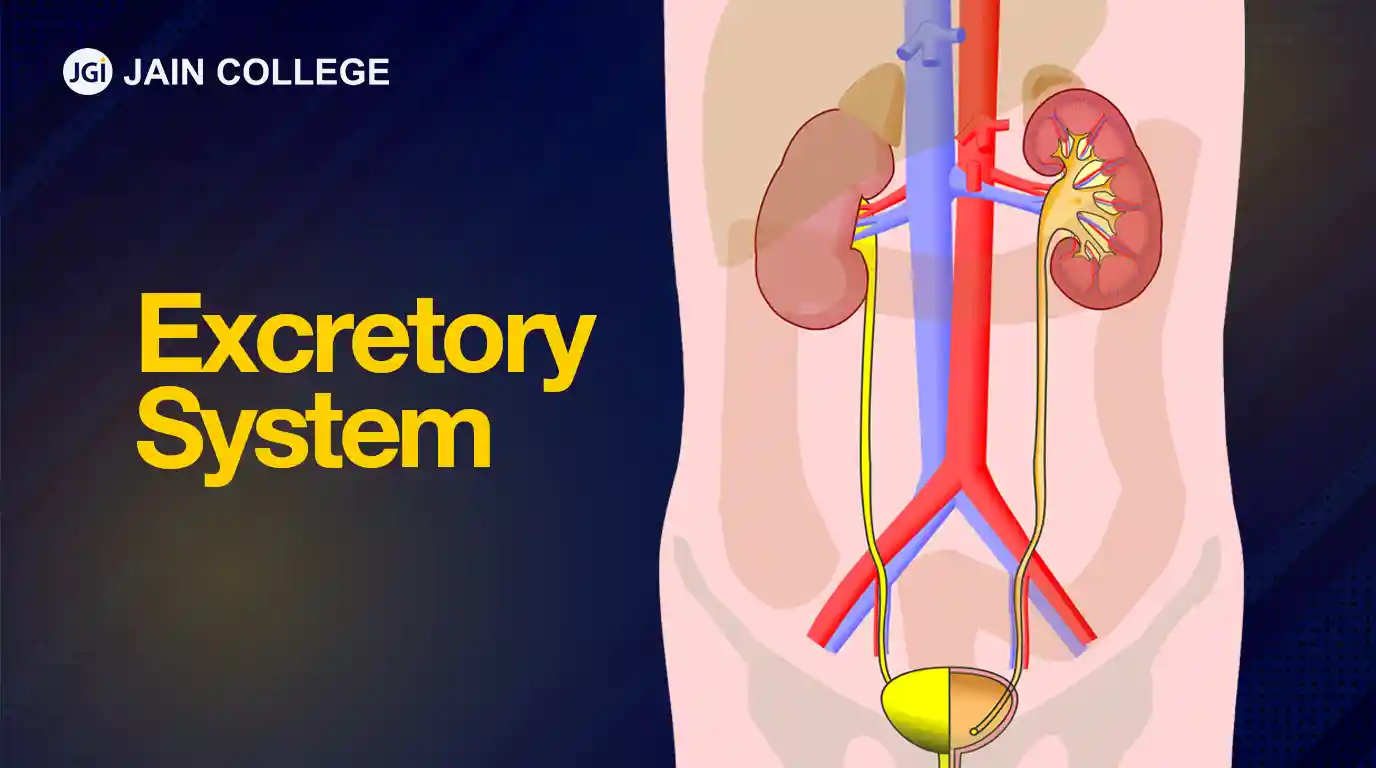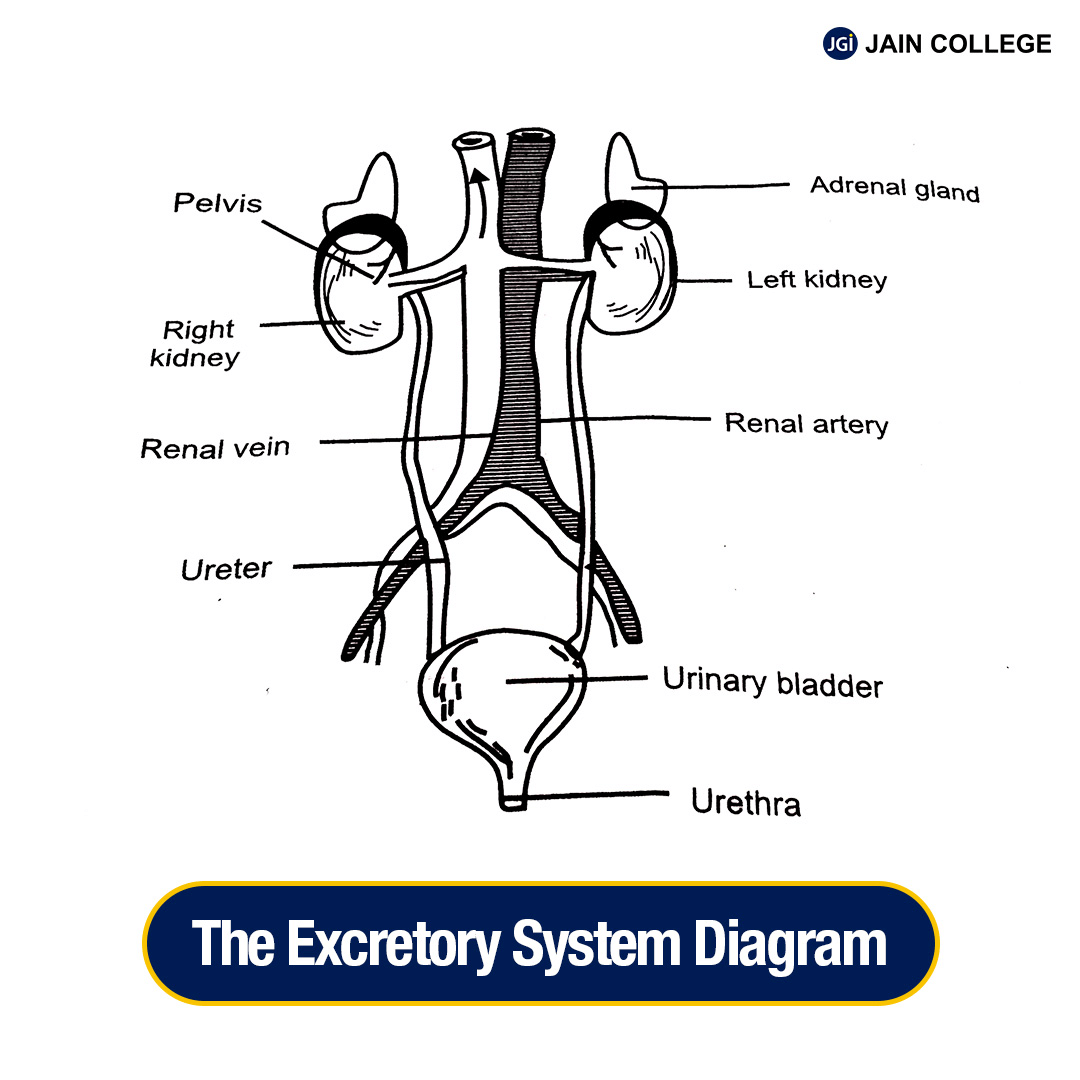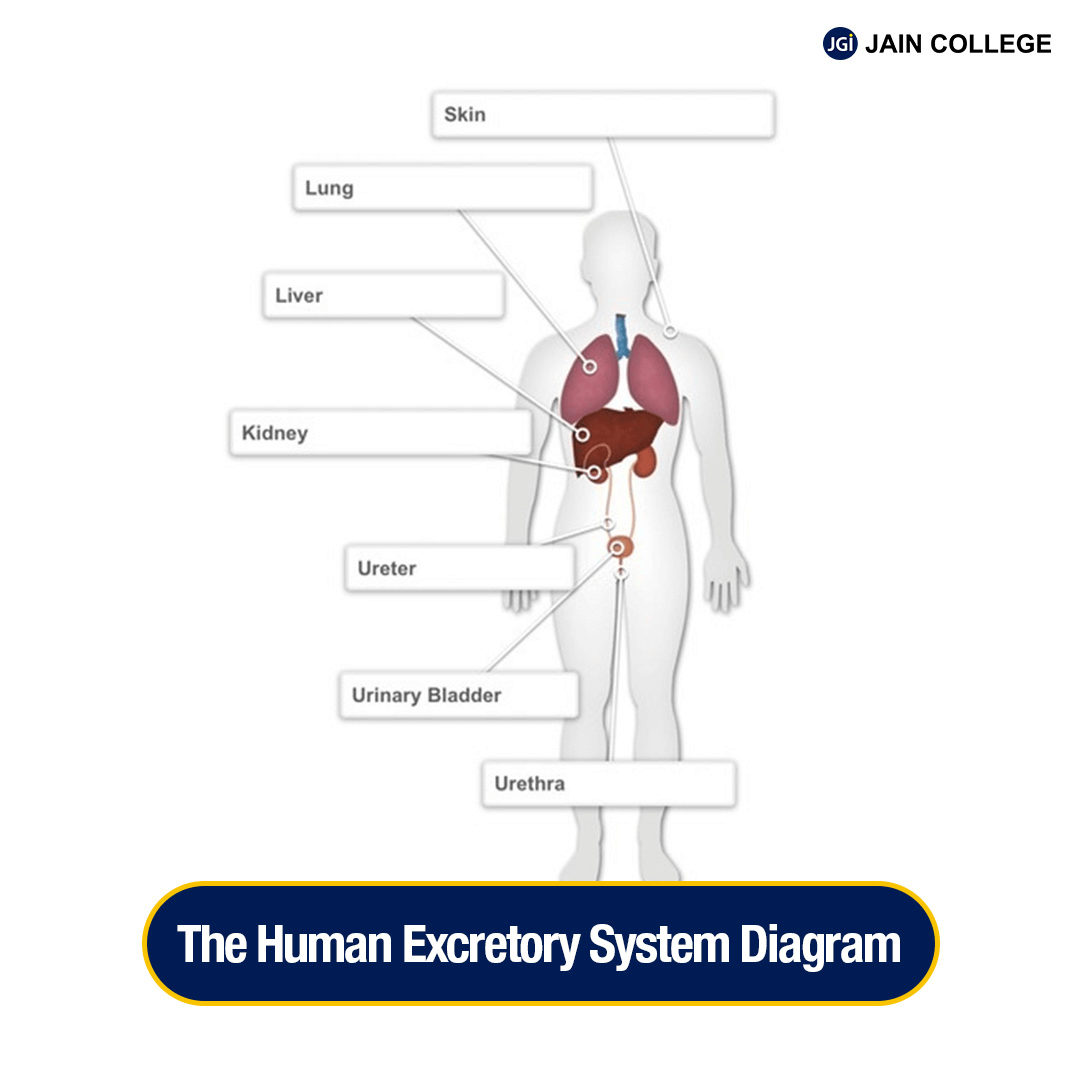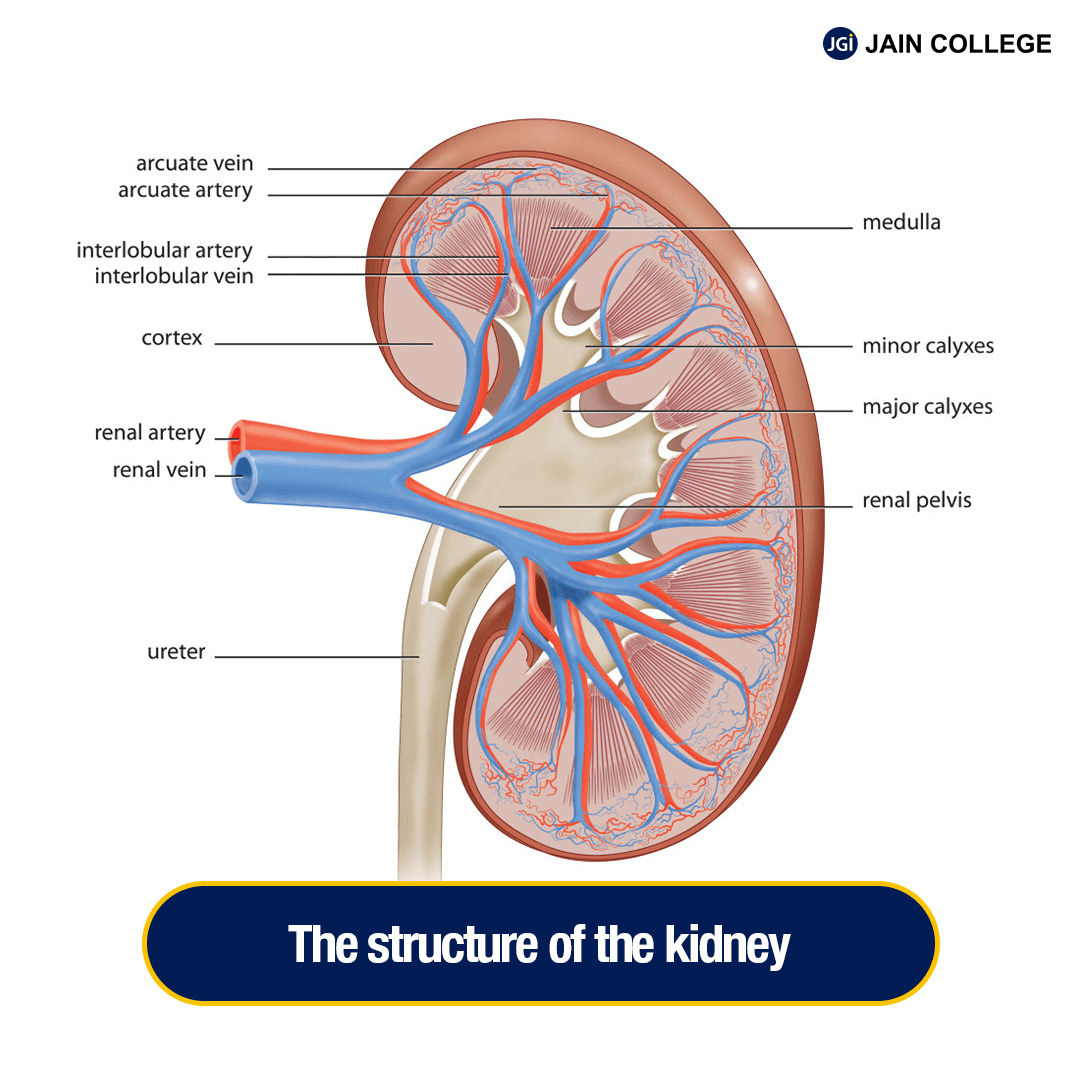
The excretory system is a vital biological system which eliminates all waste and extra fluids that our body does not need.
The excretory system helps us stay healthy and clean every time we sweat, pee, or breathe out. Without the excretory system, harmful substances would build up in our bodies, making us sick. The importance of this system cannot be overstated, even though we don't always realise it!
In this article, let us learn about the human excretory system parts and functions and in detail about our excretory system and excretory organs.
The excretory system is a vital biological system that removes excess and waste products from the body to maintain homeostasis.
The excretory system primarily involves:
Thus, without the excretory system, we would become ill from accumulated waste. It is very important to keep our excretory system healthy by drinking enough water and keeping active!
The Excretory System Diagram:

The human excretory system is made up of a few key organs that function together to remove waste and extra fluids from our bodies.
Here is a quick look at how it is all structured:
Each of these excretory system organs has a specific function and they function together to ensure our bodies stay clean and healthy by eliminating the wastes and other toxic materials from our body which are no longer required.
While the kidneys do most of the heavy lifting in the excretory system, there are a few other excretory organs that help get rid of waste and keep our body in balance.
These accessory excretory system organs include:
These accessory excretory organs work together with the kidneys to ensure our body stays clean and healthy by removing unwanted waste.
The excretory system has a few important organs that work together to remove waste and keep our bodies healthy.
Here is a quick rundown of the main ones:
A pair of kidneys - the primary excretory system organs are considered as the "filters" of the body.
This excretory organ functions by filtering the blood, eliminating the wastes and extra water and fluid, in the form of urine. We have two kidneys, and they are vital for keeping everything in balance
After the kidneys filter the blood, urine travels through two tubes called ureters to get to the bladder. It functions as a delivery system.
It is a subperitoneal, hollow, muscular excretory organ that acts as a reservoir for urine. The bladder holds the urine until we are ready to release it from our body.
This is the tube through which urine is carried out of the body from the bladder. The Urethra carries out the final step of excretion by getting rid of waste.
Lungs, the primary part of the respiratory system, also play a role in the excretory system
It is an important excretory organ, which functions by eliminating gaseous waste like carbon dioxide which is useless and harmful to our bodies.
The liver plays a crucial role in the excretory system by filtering blood, removing toxins and waste products, converting ammonia to urea, which is then excreted in urine, and producing and secreting bile.
The skin plays a vital role in the excretory system by releasing sweat, which helps get rid of extra water and salts
The Human Excretory System Diagram:

The kidneys work nonstop to keep our bodies clean by filtering out waste and excess water. It is like a little filter system that helps keep everything in balance!
The Structure of the Kidney:

The kidney is one of the most important organs in the excretory system, and it is two bean-shaped organs that are roughly the size of a fist. It plays a vital role in filtering waste.
Here is a detailed structure of the kidney:
Excretion is the process of elimination or removal of wastes and extra substances from our body that is no longer required. This process of excretion helps our body to stay healthy and balanced.
Here is a detailed explanation of how the excretion process works in our body:
A pair of kidneys is the main organ for excretion. Blood flows into the kidneys, where tiny filters called nephrons remove waste and extra water. This waste turns into urine.
Not everything in the filtered blood is waste. The body retains the necessary things which are still required, such as water, glucose, and salts, by reabsorbing them back into the bloodstream.
The waste products that do not get reabsorbed (like urea and extra salts) combine with excess water to form urine
The formed urine moves from the kidneys through the ureters down to the bladder until it is released.
During urination, urine is released from the bladder through the urethra and exits the body.
Thus, all these steps work together to make sure our body stays clean and free of waste!
The excretory system is vital for the existence of an organism. The food that we take needs to be removed as well, and it would be possible only with the help of the excretory system.
Here are some of the important functions of the Excretory System
The excretory system removes waste like urea, salts, and extra water that our body does not need. If waste builds up, it can cause problems like kidney stones or urinary infections.
The system helps keep the right balance of water, salts, and other important substances in our body.
The kidneys also help control our blood pressure by adjusting the amount of water in our body. Too much or too little water can cause our blood pressure to go up or down.
The liver and kidneys help filter out toxins and harmful substances from food, drinks, and even the air we breathe. This prevents harmful chemicals from building up in our bodies.
Waste would accumulate without the excretory system, leaving us feeling ill or frail. That is why it is important to drink plenty of water, stay active, and take care of our kidneys and skin.
Keeping this system healthy helps us feel our best!
The excretory system is crucial for getting rid of waste and keeping our body balanced.
The excretory system plays a crucial role in maintaining homeostasis by removing waste products and excess substances from the body.
Through organs like the kidneys, bladder, and urethra, the body efficiently filters blood, regulates fluid balance, and ensures the proper functioning of various physiological processes.
Without the excretory system, the accumulation of waste could lead to harmful imbalances and
severe health issues.
Understanding this system underscores its importance not only in maintaining health but also in protecting the body from toxins. As science continues to advance, further insights into the complexities of the excretory system will enhance our ability to treat and prevent related diseases, ensuring overall well-being.
Join JAIN College for top-notch Science, Commerce, and Arts programmes. Secure your path to success today!
The excretory system functions by removing waste and extra fluids from our body, keeping us healthy and clean inside.
The main organs of the excretory system include:
The kidneys function by filtering the blood to remove waste and extra water, turning it into urine, which is then excreted from the body.
Excretion is the biological process of removing waste products from the body. It is a vital process for all organisms.
Excretion is a biological process and is vital for maintaining a healthy internal environment (homeostasis) by removing wastes, toxic metabolic products and excess substances. Thus, preventing their harmful buildup and ensuring the body's smooth functioning.
The four main organs of the Human Excretory System include, the Kidney, Ureter, Urinary bladder and Urethra.
Yes. The excretory system can be affected by various factors, including infections, injuries, dehydration, poor diet, use of certain medications, kidney stones, bladder control problems, a diet high in sodium, protein, potassium, phosphate and more.
Lungs are the excretory system, which play a vital role in excretion. The primary function of the lungs is respiration (gas exchange), but they also play a role in excretion by removing carbon dioxide and water vapour from the body during exhalation.
Skin is the excretory system, which plays a vital role in excretion by excreting excess water, salts, and small amounts of urea and other waste products.

JAIN PU College, a part of the renowned JGI Group, is committed to empowering students with quality education.
Beyond academics, the college ensures its online content reflects the same standard of excellence. Every blog and article is meticulously vetted and proofread by subject matter experts to ensure accuracy, relevance, and clarity. From insightful educational topics to engaging discussions, JAIN PU College's content is crafted to inform, inspire, and add value to its readers, reflecting the institution's commitment to intellectual growth and innovation.
View all Blogs